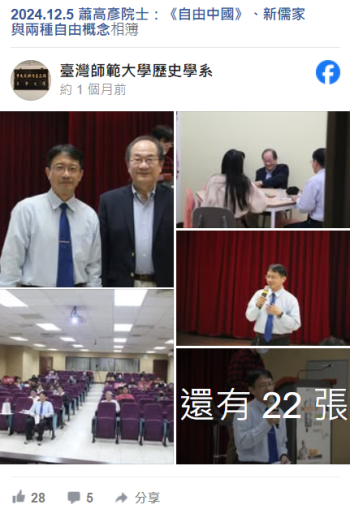蕭高彥院士講座紀要
撰稿人:本系碩士生郭昀珈
歷史系舉辦的歷史與文化院士系列講座,而這次演講主題為「《自由中國》、新儒家與兩種自由概念」,主講人為中央研究院院士蕭高彥先生。
蕭教授從大學到碩士,皆就讀於國立臺灣大學政治學系;後來在 美國耶魯大學取得博士學位。博士畢業後,任職於中央研究院,現為人文社會科學研究中心特聘研究員。蕭教授的研究專長是政治思想史、當代政治社會理論,其中核心議題包括共和主義、社群主義,以及現代國家理念的發展。目前,蕭教授著有的專著有《探索政治現代性:從馬基維利到嚴復》、《西方共和主義思想史論》等,另有發表多篇論文。
演講開始時,蕭教授引用了以賽亞.柏林(Isaiah Berlin)的「兩種自由」概念,即消極自由和積極自由。兩種自由的概念也在不同的歷史脈絡中有不同的意義,因此蕭教授提醒在研究概念演變時應注意到歷史的偶然性,不能過度依賴現有的思想理論,而需考慮時代背景與思想家面臨的現實挑戰,否則將可能陷入預期敘事與時代錯置的錯誤。
接著,蕭教授闡述隨國民政府轉遷來臺的自由主義發展。以胡適為首,在1949年間先後發表的論述,並非只是理論宣示,而是基於政治現實的考量。因此,不能僅以理論架構分析胡適此時的立場變化,也應該注意到這是現實政治、國際局勢共同作用的結果。另一方面,早期的殷海光受胡適和德里希.海耶克(Friedrich August von Hayek)的影響,認為保障個人權利和抵制極權主義是自由主義的核心。但殷海光後來失去教學和出版的自由,而逐漸轉向對積極自由的深入思考。這種轉向並非只是背離早期立場,而是在個人處境下對自由的重新體悟,體現了歷史的偶然性和思想的靈活性。
蕭教授隨後介紹張佛泉《自由與人權》。張佛泉的思想從重於消極自由,逐漸融入積極自由的元素。蕭教授指出,張佛泉的思想轉變必須置於冷戰背景下理解。所以張佛泉的思想轉變並非只是學術上的論點修正,更多是對新儒家批評的回應,反映出自由主義者在思想與現實壓力下的調整。另一方面,徐復觀、牟宗三等新儒家一方則主張道德自由優先於政治自由,認為自由應涵蓋道德層面。這一觀點與自由主義者形成了爭論。然而,蕭教授強調,因為張佛泉對自由概念的修正實際上回應了新儒家的批評,但新儒家未意識到這一點,導致雙方未能展開更深層次的討論,所以這場爭論未能充分展開,是一場「未開始的對話」。
在演講的最後,蕭教授強調思想演變往往受到具體情境、知識背景和政治環境的影響,因此解釋時應注意到歷史的偶然性和思想發展的脈絡。運用脈絡主義與系譜學分析,將有助於呈現五十年代臺灣自由觀念的多樣面貌,破解過往「自由主義者主張消極自由、新儒家主張積極自由」的既定觀念。
Writer:Jerry Wang
Free China Journal: New Confucianism and Two Concepts of Liberty
In the modern world, liberty forms the cornerstone of human rights and remains a central theme in contemporary philosophy. The evolution of the concept of liberty continues to fascinate philosophers and scholars. Professor Carl Shaw, a distinguished academician from Academia Sinica, has shared his insights on liberty and its conceptual development. He argues that the understanding of liberty in Taiwan presents diverse characteristics that cannot be fully captured by the traditional dichotomy of liberty into two distinct concepts.
Professor Shaw holds both a bachelor’s and a master’s degree in political science from National Chengchi University, and he earned his doctoral degree in political science from Yale University. His expertise lies in the history of political thought and political philosophy, and he has published numerous influential books that have contributed significantly to the field. Liberty has been one of his early research interests, and he emphasizes that his methodological approach holds value for various historical inquiries.
At the outset of his presentation, Professor Shaw discussed Isaiah Berlin’s two concepts of liberty: positive and negative liberty. He noted that the definition of these concepts has evolved over time, with each historical period shaping their meaning. Therefore, he stressed the importance of contextualizing these ideas within their respective eras to ensure accurate analyses. Just as with other historical research, scholars must consider the unpredictable nature of history to avoid misinterpretations and anachronisms.
Building on these definitions of liberty, Professor Shaw examined the development of liberalism in Taiwan after 1949. Hu Shi introduced a series of ideas and writings on liberalism, marking its symbolic inception in Taiwan. However, these ideas were primarily political in nature, rather than serving as comprehensive theoretical frameworks.
Two other scholars who significantly influenced the development of liberalism in Taiwan were Yin Hai-kuang and Chang Fo-Chuan. Yin Hai-kuang, influenced by Hu Shi and British economist Friedrich Hayek, emphasized the protection of individual rights as central to liberalism. However, after experiencing job loss and restrictions on his freedom to publish, his views evolved toward a focus on positive liberty. Professor Shaw suggested that these shifts reflect the evolving nature of individual understanding, often shaped by the contingencies of history.
In contrast, Chang Fo-Chuan leaned toward a preference for negative liberty, while integrating elements of positive liberty. His perspective sometimes conflicted with New Confucianism. For instance, New Confucian scholars like Mou Tsung-san emphasized moral freedom over political liberty, arguing that liberty must encompass moral dimensions. Professor Shaw noted that while Chang’s viewpoint inherently included moral considerations, New Confucian scholars failed to recognize this, leading to what he termed a “conversation without a beginning.”
In conclusion, Professor Shaw underscored the dynamic nature of ideological change. Personal beliefs are often shaped by social environments and individual experiences. He urged researchers to observe carefully the trends in historical development. To analyze the evolution of liberalism in the 1950s, Professor Shaw recommended employing genealogical methods to challenge biases between liberalism and New Confucianism, especially with regard to their respective understanding of liberty and freedom.
